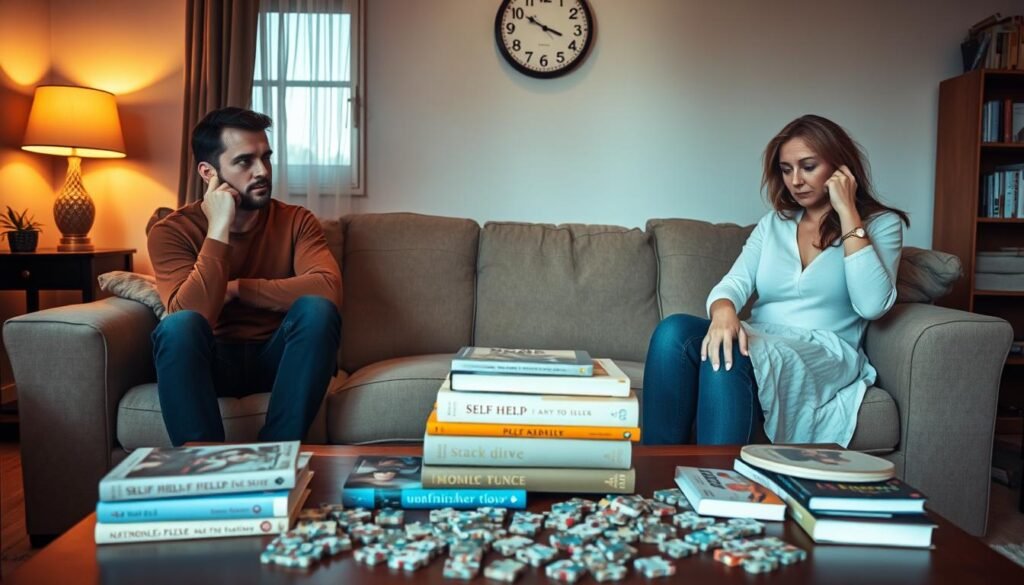Did you know about 40% of people in relationships feel anxious? This includes both new couples and those who’ve been together longer. They may feel worried, insecure, and doubt a lot. Relationship anxiety isn’t officially listed in the DSM-5. But, it shares similarities with social anxiety and depression. Knowing about it is important because it can make you feel really stressed. It can even cause tiredness and stomach issues.
This article will cover the signs, reasons, and ways to deal with relationship anxiety. You’ll learn about this complex issue. This knowledge can help improve your love life and well-being.
Key Takeaways
- Relationship anxiety is common, affecting approximately 40% of individuals in romantic relationships.
- It often leads to emotional distress and physical symptoms like fatigue and stomach upset.
- Understanding the signs of relationship anxiety can help identify and address issues in a relationship.
- Effective solutions for relationship anxiety include cognitive-behavioral therapy and mindfulness approaches.
- Open communication with partners can significantly improve the health of a relationship.
- Reflecting on past experiences can help individuals recognize patterns that contribute to their anxiety.
Understanding Relationship Anxiety
Many people feel anxious in romantic relationships. They have ongoing fears and doubts about their partnership. It’s important to know the signs of this anxiety, like fearing rejection and feeling not good enough. These emotional challenges in relationships can hurt both the person and their relationship.
Worrying a lot about where the relationship is going is a key sign of relationship anxiety. People might doubt their partner’s feelings and need lots of reassurance. This fear can make someone’s heart beat fast or make them sweat more. In serious cases, they might avoid things that make them anxious, hurting communication and experiences.
To deal with these feelings, it helps to learn about relationship anxiety. Using tools like self-assessments can show if someone might have these issues. They can find help through therapy or by taking a self-assessment quiz to understand their anxiety better.
Dealing with past bad relationship experiences and low self-esteem helps in coping with these feelings. Learning to manage relationship anxiety can lead to healthier and happier partnerships.
What Is Relationship Anxiety
Relationship anxiety is when you worry a lot about your romantic life. It makes people do things like overly checking their partner’s social media. They might also doubt their feelings a lot. This can make them feel not good enough and stressed.
Teda Kokoneshi, LMHC, says this anxiety comes with thoughts that won’t go away and upset daily life. Symptoms include not being able to eat, sleep, or focus because of worries about the relationship. The American Psychological Association points out that this stress can make people sweat, feel dizzy, and have a fast heartbeat. All of these symptoms can hurt how well someone lives their life.
Many things can cause relationship anxiety. For example, bad experiences in past relationships, especially ones lacking trust, play a big role. How we connected with people as kids affects our adult relationships too. Bad attachment when we were younger can make us feel upset in relationships as adults.
The following table shows how certain behaviors linked to relationship anxiety can affect us:
| Behavior | Potential Impact |
|---|---|
| Obsessively Checking Social Media | Leads to increased feelings of jealousy and insecurity |
| Seeking Constant Reassurance | Creates emotional instability and may overwhelm partners |
| Experiencing Physical Symptoms | Affects capability to engage in daily activities effectively |
| Fear of Losing the Partner | Can result in clinginess and dependency issues |
Understanding your symptoms and feelings about relationship anxiety can help you deal with it better. If the worries are too big, getting help from a professional might be necessary. Doing things like anxiety journaling can really help control your emotions. To learn more about how relationship anxiety can affect your body, check out these physical symptoms.
Common Signs of Relationship Anxiety
When it comes to relationship anxiety, there are certain behaviors to look out for. These behaviors show when someone is really worried about their relationship. It’s key to know these signs for handling the main causes well.
Constantly Worrying About the Relationship
People with relationship anxiety often worry a lot. They doubt how their partner feels and if they are truly committed. This worry goes beyond normal concerns and affects their daily life. Spotting these signs is vital for dealing with unsure times.
Need for Reassurance
Wanting reassurance often is common in relationship anxiety. Folks may ask their partners if they truly love them over and over. This need comes from not feeling confident or scared of being left. It’s important to notice when asking for reassurance is too much.
Fear of Loss
The scare of losing a partner can lead to acting too clingy or even hurting the relationship on purpose. This fear makes people more anxious about what’s going to happen next. Seeing relationship anxiety this way helps in finding the right support.

Impact of Relationship Anxiety on Daily Life
Relationship anxiety has a big impact on our lives. It tires us out emotionally, affecting our health and happiness. People may feel exhausted and have aches in their bodies. This can make everyday activities hard.
It can make us too clingy, too. This makes it tough to keep a good balance in how close we are to others.
Not just the person feels it, but it also strains their relationships. Couples might struggle with talking and understanding each other. They often fight over small things. This happens because of how anxious feelings shake things up in love.
Folks might also dodge deep talks, leaving their partner feeling overlooked.
Commonly seen signs are:
- Always worrying about what the partner thinks.
- Checking on them online or through messages, scared they might cheat.
- Often asking if everything’s okay between them.
Actions like these can push people away. It gets hard to trust or feel close. Also, it can get in the way of a couple’s physical connection, taking away from their shared joy. Knowing about these issues helps us manage our feelings better.

| Behavior | Effect on Daily Life |
|---|---|
| Clinginess | Inhibits personal space and independence |
| Anxiety attacks | Disrupts daily activities and focus |
| Lack of trust | Creates emotional distance and conflict |
| Overthinking | Prevents enjoyment of present moments |
| Need for reassurance | Increases tension and frustration in relationships |
By understanding how anxiety affects our feelings, we can make our relationships stronger. This leads to a caring and supportive space that’s good for our everyday lives.
Common Causes of Relationship Anxiety
It’s vital to know why relationship anxiety happens. Many reasons come from personal experiences and our minds. Understanding these reasons helps build stronger connections.
Previous Relationship Experiences
Past relationships can affect the present. Betrayals and tough breakups lead to fears in new relationships. These past hurts make people worry about what could go wrong now.
Low Self-Esteem
Feeling bad about oneself is a big reason for relationship anxiety. People may fear their partner’s opinions or losing them. This worry can cause them to seek too much reassurance.
Attachment Styles
Attachment theory explains why people feel anxious in relationships. Those with insecure attachment often fear more. These feelings can come from childhood, making it hard to trust and handle emotions. Knowing this can help solve relationship issues.

| Cause | Description |
|---|---|
| Previous Relationship Experiences | Painful past events lead to insecurity in current relationships. |
| Low Self-Esteem | Feelings of inadequacy increase anxiety levels regarding partners. |
| Attachment Styles | Poor attachment styles result from childhood, influencing trust and security. |
How Relationship Anxiety Affects Partners
Relationship anxiety can greatly impact both partners’ feelings and thoughts. The effects of anxiety on partners often show up in different ways. One might change their behavior to avoid conflicts. This can create distance and make honest talks rare.
Feeling too much all at once is another big issue. When partners do not get the relationship dynamics with anxiety, misunderstandings grow. If one person acts defensive or avoids issues, the other may feel lost. This makes it hard to talk things out without arguing.
Research shows that anxiety and family life affect each other a lot. Problems start when one person is too critical of the other’s anxiety. This bad cycle makes the anxious person feel worse. Being kind and patient helps. Showing empathy can make tough situations a bit easier to handle.
| Behavior | Potential Impact on Relationship |
|---|---|
| Excessive Accommodation | Hinders individual needs, leading to resentment |
| Silencing Needs | Creates communication gaps |
| Frustration from Anxious Behaviors | Heightens emotional distance |
| Critical Responses | Increases anxiety levels and distress |
It helps to seek professional advice if you’re facing these issues. It’s key to support your partner without enabling their anxiety. Have open talks that focus on positive things like gratitude. This kind of communication can help overcome anxiety’s effects. Trying these methods might improve your relationship. To learn more about dealing with anxiety, you can find more information here.
Ways to Manage Relationship Anxiety
To handle relationship anxiety well, it’s good to use both self-help and therapy. Learning these methods helps improve emotional health and relationships. Here are some important ways to cope with relationship anxiety.
Cognitive-Behavioral Therapy (CBT)
Cognitive-Behavioral Therapy, or CBT, is a top choice for dealing with relationship anxiety. It helps people change negative thinking patterns. By using CBT, they learn to fight baseless worries about relationships. This helps them think and act better when stressed, making them feel happier.
Mindfulness-Based Therapy
Mindfulness therapy teaches people to accept their thoughts and feelings calmly. It’s really useful for controlling relationship anxiety. It promotes self-awareness and helps manage emotions better. Meditation and deep-breathing practices also help people understand their reactions better. This leads to healthier self and partner relationships. These methods offer great tips for coping with relationship anxiety, boosting emotional toughness.
Self-Help Strategies for Overcoming Relationship Anxiety
Beating relationship anxiety requires multiple steps. Individuals should adopt specific strategies to deal with anxiety. Building self-esteem and practicing mindfulness are crucial. These approaches can make you more emotionally resilient and help create stronger relationships.
Building Self-Esteem
Feeling good about yourself is key to fighting relationship anxiety. You can boost your confidence in several ways:
- Set personal goals that make you feel successful.
- Use positive self-talk to believe in yourself more.
- Challenge negative thoughts about yourself to improve your self-view.
- Keep close to friends and family who support and motivate you.
Practicing Mindfulness
Mindfulness is a powerful way to manage relationship anxiety. It’s about staying present and kind to your feelings. To become more mindful, try these activities:
- Do meditation or breathing exercises to lessen anxiety.
- Write in a journal to understand your emotions and anxiety triggers.
- Take part in activities like yoga or walks in nature to feel better.
- Make daily choices that match your relationship goals for a fulfilling life.
Conclusion
Understanding and fixing relationship anxiety is key for healthy, meaningful connections. It’s common and can upset stable relationships. Many worry too much and seek reassurance often. Spotting the signs and reasons for anxiety is a big first step. This helps make a safe space for both partners.
To manage anxiety, know what triggers it and work on those triggers together. Practices that build mutual respect and emotional safety are key. Tools like therapy help with better understanding and communication. It’s also crucial to keep your own identity outside of the relationship.
By sharing duties and supporting each other, couples can fight relationship anxiety. This not only helps them individually but also strengthens their bond. For more tips, check out these insights on managing relationship anxiety.